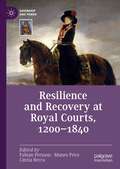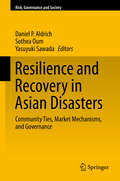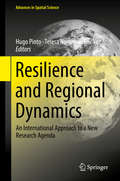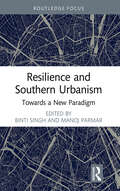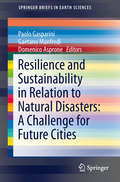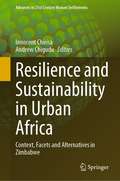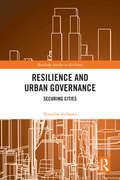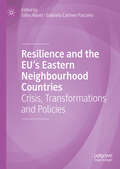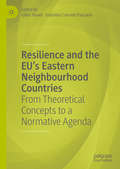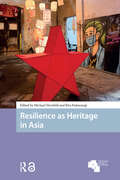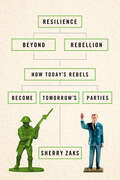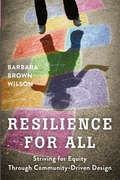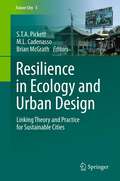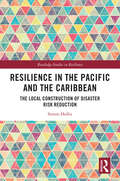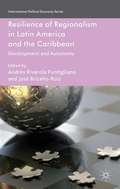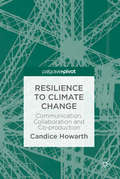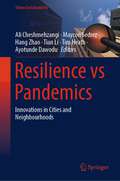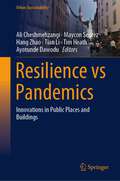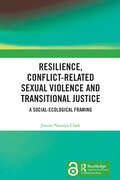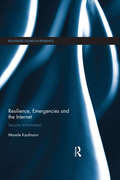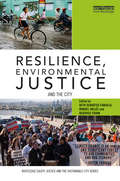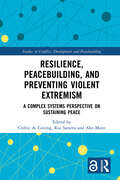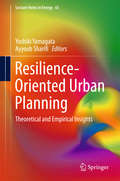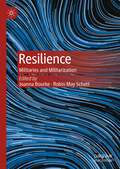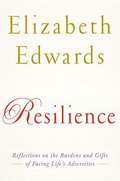- Table View
- List View
Resilience and Recovery at Royal Courts, 1200–1840 (Queenship and Power)
by Cinzia Recca Munro Price Fabian PerssonThis book demonstrates the evolution of resilience and recovery as a concept by applying it to a new context, that of courts and monarchies. These were remarkably resilient institutions, with a strength and malleability that allowed them to ‘bounce back’ time and again. This volume highlights the different forms of resilience displayed in European courts during the medieval and early modern periods. Drawing on rarely published sources, it demonstrates different models of monarchical resilience, ranging from the survival of sovereign authority in political crisis, to the royal response to pandemic challenges, to other strategies for resisting internal or external threats. Resilience and Recovery illustrates how symbolic legitimacy and effective power were strongly intertwined, creating a distinct collective memory that shaped the defence of monarchical authority over many centuries.
Resilience and Recovery in Asian Disasters
by Daniel P. Aldrich Sothea Oum Yasuyuki SawadaThis book establishes a new, holistic framework for disaster recovery and mitigation, providing a multidisciplinary perspective on the field of risk management strategies and societal and communal resilience. Going beyond narrow approaches that are all too prevalent in the field, this work builds on an optimum combination of community-level networks, private market mechanisms and state-based assistance strategies. Its chapters describe best practices in the field and elucidate cutting-edge research on recovery, highlighting the interaction between government, industry and civil society. The book uses new data from a number of recent disasters across southeast and east Asia to understand the interactions among residents, the state, and catastrophe, drawing on events in Malaysia, Vietnam, Cambodia, Japan, China and Thailand. Grounded in theories of risk mitigation and empirical research, the book provides practical guidance for decision makers along with future research directions for scholars. The Asian region is highly prone to natural disasters which devastate large and mostly poor populations. This book deals with some of the root issues underlying the continued vulnerability of these societies to catastrophic shocks. The book is unusual in that it comprehensively covers resilience and fragilities from community levels to market mechanisms and governance and it analyses these issues in very different economic and structural settings. Recommended for development and disaster risk managers--without question. Professor Debarati Guha-Sapir Director, Centre for Research on the Epidemiology of Disasters (CRED); Professor, University of Louvain, Research Institute Health and Society.
Resilience and Regional Dynamics: An International Approach to a New Research Agenda (Advances in Spatial Science)
by Hugo Pinto Teresa Noronha Eric VazEconomic and financial crises have brought the rise of unemployment, reduction of economic growth and emergence of global imbalances and tensions as countries and regions have suffered the effects of a variety of internal and external shocks. In this context of constant disruption, the scientific community has struggled to provide satisfactory answers to current economic challenges within standard frameworks. Focusing on the interconnections between innovation and resilience, this edited book contributes to a better understanding of how the crisis affects innovation and the capacity of territories to adapt and evolve. It offers both theoretical and empirical contributions that debate the notions of resilience in regional and urban contexts and serve as case studies related to innovation strategies and territorial clusters.
Resilience and Southern Urbanism: Towards a New Paradigm (Urban Futures)
by Binti Singh Manoj ParmarThis volume studies the urbanisation trends of medium-sized cities of India to develop a typology of urban resilience. It looks at historic second-tier cities like Nashik, Bhopal, Kolkata and Agra, which are laboratories of smart experiments and are subject to technological ubiquity, with rampant deployment of smart technologies and dashboard governance. The book examines the traditional values and systems of these cities that have proven to be resilient and studies how they can be adapted to contemporary times. It also highlights the vulnerabilities posed by current urban development models in these cities and presents best practices that could provide leads to address impending climate risks. The book also offers a unique Resilience Index that can drive change in the way cities are imagined and administered, customised to specific needs at various scales of application. Part of the Urban Futures series, the volume is an important contribution to the growing scholarship of southern urbanism and will be of interest to researchers and students of urban studies, urban ecology, urban sociology, architecture, geography, urban design, anthropology, cultural studies, environment, sustainability, urban planning and climate change.
Resilience and Sustainability in Relation to Natural Disasters: A Challenge for Future Cities
by Paolo Gasparini Gaetano Manfredi Domenico AsproneThe number of megacities worldwide is rapidly increasing and contemporary cities are also expanding fast. As a result, cities and their inhabitants are becoming increasingly vulnerable to the effects of catastrophic natural events such as extreme weather events (recently more frequent and intense as a result of the ongoing climate changes), earthquakes, tsunamis or man-induced events such as terrorist attacks or accidents. Furthermore, due to increasing technological complexity of urban areas, along with increasing population density, cities are becoming more and more risk attractors. The resilience of cities against catastrophic events is a major challenge of today. It requires city transformation processes to be rethought, to mitigate the effects of extreme events on the vital functions of cities and communities. Redundancy and robustness of the components of the urban fabric are essential to restore the full efficiency of the city's vital functions after an extreme event has taken place. These items were addressed by an interdisciplinary and international selection of scientists during the 6th UN-World Urban Forum that was held in Naples, Italy in September 2012. This volume represents in six chapters the views from sociologists, economists and scientists working on natural risk and physical vulnerability on resilience and sustainability for future cities in relation to natural disasters.
Resilience and Sustainability in Urban Africa: Context, Facets and Alternatives in Zimbabwe (Advances in 21st Century Human Settlements)
by Innocent Chirisa Andrew ChiguduResilience has become a very topical issue transcending many spheres and sectors of sustainable urban development. This book presents a resilience framework for sustainable cities and towns in Africa. The rise in informal settlements is due to the urban planning practices in most African cities that rarely reflect the realities of urban life and environment for urban development. Aspects of places, people and process are central to the concept of urban resilience and sustainable urban growth. It stems from the observation that urban vulnerability is on the increase in Zimbabwe and beyond. In history, disasters have adversely affected nations across the world, inflicting wide ranging losses on one hand while on the other hand creating development opportunities for urban communities. Cooperation in disaster management is a strategy for minimising losses and uplifting the affected urban settlements. The significance of urban planning and design in the growth and development of sustainable urban centres is well documented. Urbanisation has brought with it challenges that most developing countries such as Zimbabwe are not equipped to handle. This has been accompanied by problems such as overpopulation, overcrowding, shortages of resources and the growth of slum settlements. There need is to seriously consider urban planning and design in order to come up with contemporary designs that are resilient to current urban challenges. There are major gaps in urban resilience building for instance in Harare and the local authority needs to prioritise investment in resilient urban infrastructure.
Resilience and Urban Governance: Securing Cities (Routledge Studies in Resilience)
by Katarína SvitkováThis book challenges the concept of ‘urban resilience’ by exploring its impact and limitations in three cities. Resilience has become a buzzword in science, industry and policy, and this volume offers a fresh perspective on urban resilience as a regulatory and constitutive principle of governance in cities. Cities constitute an extremely relevant playground for resilience, as they are exposed to various disruptions from natural disasters and pandemics to political conflicts and terrorism. This book traces the evolution of urban resilience, from international development organizations to local governments and communities. It explores how this concept was adopted and mobilized by different actors for different purposes, and analyses the resulting resilience momentum in Barcelona, San Francisco, and Santiago. The book outlines the extent to which resilience has become a universal policy tool and a desired end-state, despite its clearly problematic definition. It also contributes to the discussion about contemporary governance, safety and security in times when their very nature and feasibility are being questioned. This book will be of much interest to students of resilience studies, urban studies, development studies, human geography, and International Relations.
Resilience and the EU's Eastern Neighbourhood Countries: Crisis, Transformations and Policies
by Gilles Rouet Gabriela Carmen PascariuThis new edition provides a detailed and systemic analysis of the shocks and vulnerabilities seen within Eastern Europe and their impact on medium and long-term economic stability and the sustainable development of the region. Fully revised to account for the dramatic changes within Eastern Europe since the COVID-19 pandemic and the war in Ukraine, it examines economic, social, institutional, and political fragility within countries within the Eastern part of the EU and presents an economic framework and policies form overcoming these challenges and creating greater economic resilience. A particular focus is given to issues of economic governance, long-term economic growth, energy security, job creation, and climate action. This book highlights the need of economic resilience and looks at ways EU policies can create this within Eastern Europe. It will be relevant to students, researchers, and policymakers interested in the political economy and economic policy.
Resilience and the EU's Eastern Neighbourhood Countries: From Theoretical Concepts to a Normative Agenda
by Gilles Rouet Gabriela Carmen PascariuResilience has emerged as a key concept in EU foreign policy. The policy debate around this concept has been vigorous, but theoretical attempts to develop the concept are few. Covering fields of strategical importance, such as economic governance; growth and sustainable development; energy, environment and climate action; education, the labour market, and foreign affairs, this book is one of the first attempts to profoundly theorise the concept of ‘resilience’ in international relations by looking at several policy areas and countries. Faced with multiple crises (the economic crisis, the Brexit referendum, the refugee crisis, terrorist attacks, geopolitics such as events in the Ukraine), and challenges with its integration process, the European Union needs to become not only more intelligent, more inclusive and more sustainable, but also more resilient and more capable of reacting to different internal and external shocks. This book integrates a systemic assessment of the regions’ specific shocks and risks in relation to internal vulnerabilities (i.e. structural economic, social, institutional and political fragility) and to their long and medium-term impact on the stability, security and sustainable development in the region.
Resilience as Heritage in Asia (Asian Heritages)
by Michael Herzfeld Rita PadawangiResilience as Heritage in Asia analyzes forms of collective resilience through manifestations of strength-in-fragility in selected communities in Asia (Indonesia, Japan, Malaysia, the Philippines, Singapore, and Thailand). Persistent resistance to communal erasure taking place through repressive policies and commercialized, multinational urban development insensitive to local communities and values often presents an uphill battle. Some of these collective efforts to survive through persistent everyday actions, encounters, and constant struggles have successful outcomes, while others are ephemeral at best. The authors argue that persisting vernacular spaces located between resistance and co-optation are themselves a form of local cultural heritage in the rapidly urbanizing region. Recognizing these nonconformist forms of resilience as heritage acknowledges the creativity involved in challenging social and political inequalities. Supporting the cultural autonomy of local communities by acknowledging resilience as heritage contributes to social justice in the region.
Resilience beyond Rebellion: How Today's Rebels Become Tomorrow's Parties
by Sherry ZaksResilience beyond Rebellion addresses a critical question in insurgency studies: Why some rebel groups successfully become political parties, while others die trying. Only half of rebel groups with political aspirations manage to reinvent themselves as lasting political parties. Sherry Zaks argues that the key to successful rebel-to-party transformations lies in the organizational structures and institutions that rebels build during wartime. These proto-party structures, which involve governance, political messaging, social outreach, and other noncombat tasks, equip rebel groups with the personnel, skills, and routines needed to succeed in the electoral arena.Zaks draws on insights from organizational sociology to reconceptualize how rebel groups operate. Through examining the Farabundo Martí National Liberation Front in El Salvador and other cases, they demonstrate that rebel groups with established proto-party structures often form the core of post-conflict parties and attract more votes. Innovative in approach and rich in evidence, Resilience beyond Rebellion advances our understanding of rebel group dynamics both during and after conflict by showing that party-building begins not with the last bullet fired but with the very first.
Resilience for All: Striving for Equity Through Community-Driven Design
by Barbara Brown WilsonIn the United States, people of color are disproportionally more likely to live in environments with poor air quality, in closeproximity to toxic waste, and in locations more vulnerable to climate change and extreme weather events.In many vulnerable neighborhoods, structural racism and classism prevent residents from having a seat at the table when decisions are made about their community. In an effort to overcome power imbalances and ensure local knowledgeinforms decision-making, a new approach to community engagement is essential.In Resilience for All, Barbara Brown Wilson looks at less conventional, but often more effective methods to makecommunities more resilient. She takes an in-depth look at what equitable, positive change through community-drivendesign looks like in four communities—East Biloxi, Mississippi; the Lower East Side of Manhattan; the Denbyneighborhood in Detroit, Michigan; and the Cully neighborhood in Portland, Oregon. These vulnerable communities haveprevailed in spite of serious urban stressors such as climate change, gentrification, and disinvestment. Wilson looks at how the lessons in the case studies and other examples might more broadly inform future practice. She shows how community-driven design projects in underserved neighborhoods can not only change the built world, but also provide opportunities for residents to build their own capacities.
Resilience in Ecology and Urban Design
by S.T.A. Pickett Brian Mcgrath M. L. CadenassoThe contributors to this volume propose strategies of urgent and vital importance that aim to make today's urban environments more resilient. Resilience, the ability of complex systems to adapt to changing conditions, is a key frontier in ecological research and is especially relevant in creative urban design, as urban areas exemplify complex systems. With something approaching half of the world's population now residing in coastal urban zones, many of which are vulnerable both to floods originating inland and rising sea levels, making urban areas more robust in the face of environmental threats must be a policy ambition of the highest priority. The complexity of urban areas results from their spatial heterogeneity, their intertwined material and energy fluxes, and the integration of social and natural processes. All of these features can be altered by intentional planning and design. The complex, integrated suite of urban structures and processes together affect the adaptive resilience of urban systems, but also presupposes that planners can intervene in positive ways. As examples accumulate of linkage between sustainability and building/landscape design, such as the Shanghai Chemical Industrial Park and Toronto's Lower Don River area, this book unites the ideas, data, and insights of ecologists and related scientists with those of urban designers. It aims to integrate a formerly atomized dialog to help both disciplines promote urban resilience.
Resilience in the Pacific and the Caribbean: The Local Construction of Disaster Risk Reduction (Routledge Studies in Resilience)
by Simon HollisThis book critically examines the global diffusion and local reception of resilience through the implementation of Disaster Risk Reduction (DRR) programmes in Pacific and Caribbean island states. Global efforts to strengthen local disaster resilience capacities have become a staple of international development activity in recent decades, yet the successful implementation of DRR projects designed to strengthen local resilience remains elusive. While there are pockets of success, a gap remains between global expectations and local realities. Through a critical realist study of global and local worldviews of resilience in the Pacific and Caribbean islands, this book argues that the global advocacy of DRR remains inadequate because of a failure to prioritise a person-orientated ethics in its conceptualization of disaster resilience. This regional comparison provides a valuable lens to understand the underlying social structures that makes resilience possible and the extent to which local governments, communities and persons interpret and modify their behaviour on risk when faced with the global message on resilience. This book will be of much interest to students of resilience, risk management, development studies, and area studies.
Resilience of Regionalism in Latin America and the Caribbean: Development and Autonomy (International Political Economy)
by Andrés Rivarola Puntigliano José Briceño-RuizAs regionalisation becomes an increasingly hot topic, the authors explain why regionalism has been most successful in Latin America and analyse current processes and opinions of possible future developments in the region, including the Caribbean, Central America, Brazil, and Mexico.
Resilience to Climate Change: Communication, Collaboration and Co-production
by Candice HowarthThe frequency and intensity of climate shocks such as heatwaves and flooding, are expected to increase under a changing climate with severe implications across the food, energy, water, environment nexus. This book critically explores how to improve resilience to climate shocks by examining the range of challenges and opportunities that exist in the aftermath of shocks and discusses factors that exacerbate and mitigate these. It innovatively discusses the importance of embedding communication, collaboration and co-production within resilience-building across sectors and stakeholders. Doing so with policy, practitioner and scientific communities, Candice Howarth argues, can pave the way to overcome challenges that emerge from climate shocks and facilitate the co-design of sustainable, robust and resilient responses.
Resilience vs Pandemics: Innovations in Cities and Neighbourhoods (Urban Sustainability)
by Ali Cheshmehzangi Ayotunde Dawodu Tim Heath Hang Zhao Maycon Sedrez Tian LiThe COVID-19 pandemic and other highly transmissible diseases outbreaks have given a new significance to the concept of “resilience”, placing it in the spotlight of built environment-related studies. New directions have emerged from expanding on adaptive planning, urban layouts, urban morphologies, spatial planning, healthy cities, etc. To enhance resilience in the post-pandemic era, various theories, practices, and hypotheses are being formulated by scholars around the world.For this book project, we invite chapter proposals that provide forefront discoveries about the built environment resilience during and after the ongoing pandemic. Historical perspectives of resilience and other highly transmissible diseases are also relevant to understanding the COVID-19 issues. The authors are encouraged to elaborate on critical exploratory, innovative, and cutting-edge research approaches, highlighting the effects of COVID-19 and other highly transmissible diseases in the design, planning, and perception of the built environment. We aim to gather scientific experiences, reviews, analyses, discussions, recommendations, and solutions in the fields of urban planning, urban design, urban management, environmental science, architecture, etc.The book aims to document resilience-related innovations and new perspectives for the built environment, how people’s interactions adapt to new realities, and which mechanisms, tools, and strategies are required for such transformations in the following two scales of the built environments:(1) City/district; research on planning, commuting and mobility, politics, urban configurations, regulations, transmission and prevention, models, top-down processes, innovation processes, etc.(2) Community/neighborhood; research on collaboration, transmission and prevention, isolation and quarantine, social aspects, accessibility to services, technologies, education, policies, and innovative solutions.The book covers a wide range of studies, including physical and non-physical studies, which may refer to the city infrastructure, green/blue spaces, housing, policy-making, health services, social and economic issues, etc. The findings and results contribute to the decision-making of governments, organizations, and institutions, as well as inspire scholars and future research for developing resilience in the post-pandemic era.
Resilience vs Pandemics: Innovations in Public Places and Buildings (Urban Sustainability)
by Ali Cheshmehzangi Ayotunde Dawodu Tim Heath Hang Zhao Maycon Sedrez Tian Li“Resilience vs Pandemics: Innovations in Public Places and Buildings” explores innovative solutions for architecture and public places during and after the pandemic. Additionally, the authors contribute to the documentation of architectural and social transformations that have been prompted by previous transmissible diseases, as this knowledge can inform responses to future pandemics. In this volume, the chapters present critical, exploratory, multi- and interdisciplinary, and cutting-edge research approaches; with a particular focus on the effects of COVID-19 and other highly transmissible diseases on the design, use, performance, and perception of the built environment, particularly at the building scale. This volume aims to organize a collection of scientific studies, reviews, analysis, recommendations, and solutions in the fields of urban design, architecture, design, landscape design, etc. The overarching goal is to document new approaches to create and enhance built environment resilience. Chapters shed light on novel methods, tools, processes, regulations, behaviours, and other relevant details contributing to a comprehensive understanding of this crucial issue. The two scales of the built environment under consideration are: (1) Public Places, including research on transformations (death, emergencies, changes), requirements, adaptability, usability, virtual immersion, historical perspectives, interactivity, shifts in use and programs, etc.(2) Buildings, including regulations, shifts in use and program, non-pharmaceutical interventions, human interactions, and human-machine interfaces. The book covers a wide range of studies, including physical and non-physical studies, which may refer to the city infrastructure, green/blue spaces, housing, policy-making, health services, social and economic issues, etc. The findings and results of various global case study examples contribute to the decision-making of governments, organizations, and institutions, as well as inspire scholars and future research for developing resilience in the post-pandemic era.
Resilience, Conflict-Related Sexual Violence and Transitional Justice: A Social-Ecological Framing
by Janine Natalya ClarkThis interdisciplinary book constitutes the first major and comparative study of resilience focused on victims-/survivors of conflict-related sexual violence (CRSV). Locating resilience in the relationships and interactions between individuals and their social ecologies (including family, community, non-governmental organisations and the natural environment), the book develops its own conceptual framework based on the idea of connectivity. It applies the framework to its analysis of rich empirical data from Bosnia-Herzegovina, Colombia and Uganda, and it tells a set of stories about resilience through the contextual, dynamic and storied connectivities between individuals and their social ecologies. Ultimately, it utilises the three elements of the framework – namely, broken and ruptured connectivities, supportive and sustaining connectivities and new connectivities – to argue the case for developing the field of transitional justice in new social-ecological directions, and to explore what this might conceptually and practically entail. The book will particularly appeal to anyone with an interest in, or curiosity about, resilience, and to scholars, researchers and policy makers working on CRSV and/or transitional justice. The fact that resilience has received surprisingly little attention within existing literature on either CRSV or transitional justice accentuates the significance of this research and the originality of its conceptual and empirical contributions.
Resilience, Emergencies and the Internet: Security In-Formation (Routledge Studies in Resilience)
by Mareile KaufmannThis book traces how resilience is conceptually grounded in an understanding of the world as interconnected, complex and emergent. In an interconnected world, we are exposed to radical uncertainties, which require new modes of handling them. Security no longer means the promise of protection, but it is redefined as resilience - as security in-formation. Information and the Internet not only play a key role for our understanding of security in highly connected societies, but also for resilience as a new program of tackling emergencies. Social media, cyber-exercises, the collection of digital data and new developments in Internet policy shape resilience as a new form of security governance. Through case studies in these four areas this book documents and critically discusses the relationship between resilience, the Internet and security governance. It takes the reader on a journey from the rise of complexity narratives in the context of security policy to a discussion of the Internet’s influence on resilience practices, and ends with a theory of resilience and the relational. The book shows how the Internet nourishes narratives of connectivity, complexity and emergency in political discourses, and how it brings about new resilience practices. This book will be of much interest to students of resilience studies, Critical Security Studies, Internet-politics, and International Relations in general.
Resilience, Environmental Justice and the City (Routledge Equity, Justice and the Sustainable City series)
by Beth Schaefer Caniglia Manuel Vallee Beatrice FrankUrban centres are bastions of inequalities, where poverty, marginalization, segregation and health insecurity are magnified. Minorities and the poor – often residing in neighbourhoods characterized by degraded infrastructures, food and job insecurity, limited access to transport and health care, and other inadequate public services – are inherently vulnerable, especially at risk in times of shock or change as they lack the option to avoid, mitigate and adapt to threats. Offering both theoretical and practical approaches, this book proposes critical perspectives and an interdisciplinary lens on urban inequalities in light of individual, group, community and system vulnerabilities and resilience. Touching upon current research trends in food justice, environmental injustice through socio-spatial tactics and solution-based approaches towards urban community resilience, Resilience, Environmental Justice and the City promotes perspectives which transition away from the traditional discussions surrounding environmental justice and pinpoints the need to address urban social inequalities beyond the build environment, championing approaches that help embed social vulnerabilities and resilience in urban planning. With its methodological and dynamic approach to the intertwined nature of resilience and environmental justice in urban cities, this book will be of great interest to students, scholars and practitioners within urban studies, environmental management, environmental sociology and public administration.
Resilience, Peacebuilding, and Preventing Violent Extremism: A Complex Systems Perspective on Sustaining Peace (Studies in Conflict, Development and Peacebuilding)
by Cedric De ConingThis book offers a comprehensive analysis of the complex drivers of violent extremism, along with recommendations for strengthening social and institutional resilience through peacebuilding and development efforts.By presenting a theoretical and empirical argument that places the emphasis on social cohesion, resilience, and adaptive peacebuilding, this book challenges the conventional security-led approach to countering violent extremism. Through a range of case studies from Africa, Asia, and the Middle East, including Syria, Iraq, Mozambique, Niger, Sri Lanka, and the Philippines, it explores the complex dynamics of violent extremism and the ways in which it can be prevented and countered. Drawing on complexity theory and adaptive peacebuilding, the volume provides insights into how complex social systems adapt and respond to stress, and how peacebuilders can support societies in uncertain, volatile, and unpredictable contexts by improving their resilience and their adaptive capacity to sustain peace.This book will be of much interest to students of peacebuilding, security studies and countering violent extremism, and professional practitioners.The Open Access version of this book, available at www.taylorfrancis.com, has been made available under a Creative Commons Attribution-Non Commercial-No Derivatives (CC-BY-NC-ND) 4.0 license.
Resilience-Oriented Urban Planning: Theoretical And Empirical Insights (Lecture Notes In Energy #65)
by Yoshiki Yamagata Ayyoob SharifiThis book explores key theoretical and empirical issues related to the development and implementation of planning strategies that can provide guidance on the transition to climate-compatible and low-carbon urban development. It especially focuses on integrating resilience thinking into the urban planning process, and explains how such an integration can contribute to reflecting the dynamic properties of cities and coping with the uncertainties inherent in future climate change projections.Some of the main questions addressed are: What are the innovative methods and processes needed to incorporate resilience thinking into urban planning? What are the characteristics of a resilient urban form and what are the challenges associated with integrating them into urban development? Also, how can the resilience of cities be measured and what are the main constituents of an urban resilience assessment framework? In addition to addressing these crucial questions, the book features several case studies from around the world, investigating methodologies, challenges, and opportunities for mainstreaming climate resilience in the theory and practice of urban planning. Featuring contributions by prominent researchers from around the world, the book offers a valuable resource for students, academics and practitioners alike.
Resilience: Militaries and Militarization
by Robin May Schott Joanna BourkeThis book explores the concept of ‘resilience’ in the context of militaries and militarization. Focusing on the U.S., Britain, Canada, Australia, and continental Europe, it argues that, post-9/11, there has been a shift away from ‘trauma’ and towards ‘resilience’ in framing and understanding human responses to calamitous events. The contributors to this volume show how resilience-speech has been militarized, and deeply entrenched in imagined communities. As the concept travels, it is applied in diverse and often contradictory ways to a vast array of experiences, contexts, and scientific fields and disciplines. By embracing diverse methodologies and perspectives, this book reflects on how resilience has been weaponized and employed in highly gendered ways, and how it is central to neoliberal governance in the twenty-first century. While critical of the use of resilience, the chapters also reflects on more positive ways for humans to respond to unforeseen challenges.
Resilience: Reflections on the Burdens and Gifts of Facing Life’s Adversities
by Elizabeth EdwardsOn the surface, it may seem that Elizabeth Edwards has led a rather charmed life. In many ways, she has. Beautiful family. Thriving career. Supportive friendship. Loving marriage. But she's no stranger to adversity. Many know of the strength she had shown after her son, Wade, was killed in a freak car accident when he was only sixteen years old. She would exhibit this remarkable grace and courage again when the very private matter of her husband's infidelity became public fodder. And her own life has been on the line. Days before the 2004 presidential election--when her husband John was running for vice president--she was diagnosed with breast cancer. After rounds of surgery, chemotherapy, and radiation the cancer went away--only to reoccur in 2007. While on the campaign trail, Elizabeth met many others who have had to contend with serious adversity in their lives, and in Resilience, she draws on their experiences as well as her own, crafting an unsentimental and ultimately inspirational meditation on the gifts we can find among life's biggest challenges.
